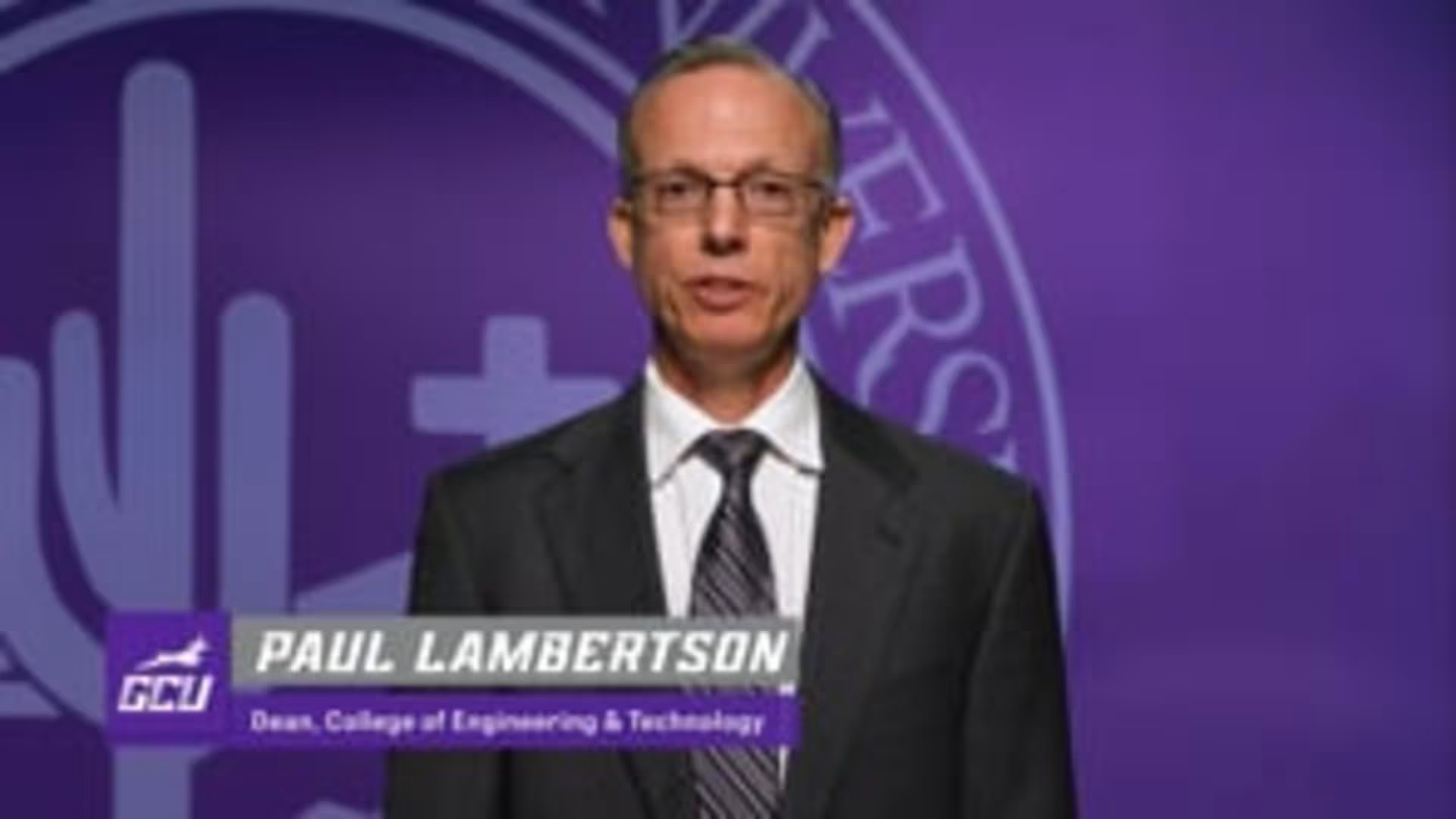
Bachelor’s Degrees in Engineering
Join Our Engineering Community
If you enjoy tackling real-life challenges, innovating with technology and creating a meaningful impact, you might consider enrolling in an undergraduate engineering degree program at Grand Canyon University. Our programs cover mechanical, electrical, aerospace and other engineering fields, nurturing your passion for solving problems, thinking critically, creatively driving advancements and addressing global challenges. The College of Engineering and Technology offers a variety of BS in engineering disciplines with a focus on practical skills, theoretical knowledge and hands-on experiences to help prepare you to become a versatile professional.

"GCU is my top school for engineering. Other colleges had machine shops on campus, but they were restricted. The access GCU gives you to hands-on facilities is unparalleled."
"GCU is my top school for engineering. Other colleges had machine shops on campus, but they were restricted. The access GCU gives you to hands-on facilities is unparalleled."

Mechanical Engineering and MET Degrees at GCU
Whether you're interested in pursuing a mechanical engineering or mechanical engineering technology (MET) degree, GCU provides a range of options tailored to meet your needs as you embark on your journey in these fields.
Design the Future
Take your mechanical engineering degree to the next level by emphasizing a specific area that intrigues you. Dive into a particular domain, gaining comprehensive expertise to tackle practical engineering challenges effectively. This focused approach can bolster your profile for roles that value specialized knowledge within your preferred industry.
Hands-On Engineering
Studying mechanical engineering technology can provide you with the opportunity to develop a diverse set of skills to address challenges in mechanical systems, design and innovation, contributing to advancements in various industries and sectors.
Mechanical Engineering Technology Degrees:
Bachelor’s Degrees in Engineering for Other Industries
Explore degree programs tailored for diverse industries beyond traditional engineering sectors. These programs offer specialized knowledge and skills that can help prepare you for roles in fields such as healthcare, environmental science, manufacturing and computer technology.
This emphasis integrates principles from engineering and biology to develop innovative solutions for healthcare challenges.
Discover our bachelor’s degree in engineering, which offers a concentrated emphasis in project management to align with your career aspirations.
Computer engineering degrees blend hardware and software knowledge to design and develop computing systems and technology solutions.
Industrial engineering degrees focus on optimizing systems and processes to enhance efficiency and productivity in diverse industries.
This focus is on designing and developing electrical systems, components and devices, emphasizing the principles of electricity and electromagnetism.
Selecting a BS degree in software engineering offers a structured approach to mastering programming languages, software development methodologies and advanced problem-solving skills essential for the tech industry.
Take Practical Engineering Courses
Explore essential topics in engineering courses that can be crucial for your career in the engineering field. With focused emphasis programs, we will cover specific areas that are relevant to your chosen engineering discipline in greater depth.
Topics covered may include:
Computer engineering
Digital logic and software design
Electrical engineering
Circuit analysis and power systems
Industrial engineering
Supply chain management and quality control
Biomedical engineering
Biomaterials and medical imaging

Related Minors for Undergraduate Engineering Majors
Adding a minor in engineering from the College of Engineering and Technology can complement your undergraduate engineering degree. Explore our range of minor options, from electrical engineering to mechanical engineering, to help enhance your skills and broaden your perspective as you prepare for your engineering career.
Career Paths for Graduates With a BS for Engineering
Graduates who earn an undergraduate engineering degree may have a wide array of opportunities to explore upon graduation.
Some potential career paths may include the following:
Architectural and engineering manager
Aerospace engineer
Computer hardware engineer
Electrical engineers
Electronics engineer
Bioengineer and biomedical engineer
Cost estimator
Mechanical engineer
Engineer
Database architect
Software developer
Software quality assurance analyst and tester
Industrial production manager
Industrial engineer
Median annual wage for aerospace engineers in May 2023(See disclaimer 3)
Number of new jobs estimated for electrical and electronic engineers from 2022 to 2032(See disclaimer 4)
FAQs for Bachelor’s Degrees in Engineering
If you're considering pursuing an engineering bachelor’s degree, you might have questions about the program, career prospects and degree options. Explore frequently asked questions to better understand the opportunities available in the field of engineering.
What bachelor’s degree for engineering should I get?
Is an engineering degree a Bachelor of Science?
What degree do you need to be an engineer?
How many kinds of engineering degrees are there?
What undergraduate classes do engineers take in college?
Benefits of Earning Your BS for Engineering
Our engineering-focused programs can help equip you with a solid foundation in engineering principles, problem-solving techniques and technical skills needed in the field. Undergraduate engineering studies can teach valuable skills in designing innovative products, developing sustainable solutions and leading engineering projects, paving the way for potential careers in the engineering realm.
Additionally, the U.S. Bureau of Labor (BLS) Occupational Outlook Handbook estimates job growth for architecture and engineering careers to increase faster than average, accounting for an estimated increase of 188,000 jobs in the field from 2022 to 2032.(See disclaimer 1)
Explore On-Campus Engineering Bachelor’s Programs
ABET and HLC Accreditation
Student Resources and Support
As a student at GCU, you can access invaluable resources and a supportive community designed for your engineering specialization within the College of Engineering and Technology. Explore the provided resources, as well as online tools beneficial to all students.

Whether you have questions or need more information on enrolling in a bachelor’s in engineering degree with GCU, we are here to help.
- COVID-19 has adversely affected the global economy and data from 2020 to 2022 may be atypical compared to prior years. Accordingly, data shown is effective September 2023, which can be found here: U.S. Bureau of Labor Statistics, Occupational Outlook Handbook, Architecture and Engineering Occupations, retrieved May 1, 2024.
- U.S. Bureau of Labor Statistics. (2023, Sept. 6). Field of Degree: Engineering. Occupational Outlook Handbook. Retrieved May 1, 2024.
- The earnings referenced were reported by the U.S. Bureau of Labor Statistics (BLS), Aerospace Engineers as of May 2023, retrieved May 1, 2024. Due to COVID-19, data from 2020 to 2023 may be atypical compared to prior years. BLS calculates the median using salaries of workers nationwide with varying levels of education and experience. It does not reflect the earnings of GCU graduates as aerospace engineers, nor does it reflect the earnings of workers in one city or region of the country or a typical entry-level salary. Median income is the statistical midpoint for the range of salaries in a specific occupation. It represents what you would earn if you were paid more money than half the workers in an occupation, and less than half the workers in an occupation. It may give you a basis to estimate what you might earn at some point if you enter this career. Grand Canyon University can make no guarantees on individual graduates’ salaries. Your employability will be determined by numerous factors over which GCU has no control, such as the employer the graduate chooses to apply to, the graduate’s experience level, individual characteristics, skills, etc. against a pool of candidates.
- COVID-19 has adversely affected the global economy and data from 2020 to 2022 may be atypical compared to prior years. Accordingly, data shown is effective September 2023, which can be found here: U.S. Bureau of Labor Statistics, Occupational Outlook Handbook, Electrical and Electronics Engineers, retrieved May 1, 2024.

